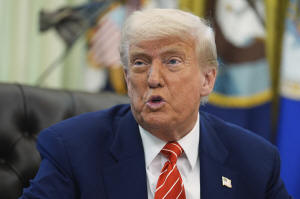Trump appears to undercut US proposal to Iran, declaring he won't allow
any uranium enrichment
[June 03, 2025]
By ZEKE MILLER and MATTHEW LEE
WASHINGTON (AP) — President Donald Trump on Monday appeared to undercut
a proposal that was offered by his special envoy to Iran, saying he will
insist that Tehran fully dismantle its nuclear enrichment program as
part of any deal to ease crushing sanctions.
Trump and Steve Witkoff, who is leading the negotiations for the U.S.,
have repeatedly offered inconsistent public messages about whether Iran
would be allowed to retain the capacity to enrich uranium to lower
levels for civilian purposes. The Trump administration maintains that it
will not allow Iran to develop a nuclear weapon.
The negotiations have been framed by Trump as both countries’ best
chance to avoid direct military conflict over Iran’s nuclear program.
Tehran, which denies seeking a nuclear weapon, has insisted that it will
not agree to any deal that fully scraps its enrichment program.
“Under our potential Agreement — WE WILL NOT ALLOW ANY ENRICHMENT OF
URANIUM!” Trump wrote on social media.
Addressing the seeming contradiction, a White House official said Trump
was speaking the “cold, hard truth.” The official said the terms the
U.S. gave the Iranians were “very tough” and would make it impossible
for them to obtain a nuclear bomb.
Trump’s post comes after media reports that Witkoff’s latest proposal to
Tehran would allow Iran to retain low levels of enrichment for civilian
uses like nuclear medicine and commercial power if it agrees to shut
down its heavily protected underground sites for a period of time. The
U.S. and Iran have engaged in several rounds of direct nuclear talks for
the first time in years.

Senior officials — including Witkoff and Trump himself — have said
within the last few weeks that Iran would not be able to keep enriching
uranium at any level.
The proposal, reported by Axios and confirmed by a U.S. official, called
for the creation of a regional consortium to handle uranium enrichment
for civilian uses — a plan first studied more than a decade ago in
negotiations that led to the 2015 Iran nuclear deal.
Trump was sharply critical of that agreement — which also allowed set
limits on uranium enrichment but permitted Iran to maintain such a
capacity — and withdrew the U.S. from it in 2017 during his first term.
The officials spoke to The Associated Press on condition of anonymity to
discuss private diplomatic negotiations.
[to top of second column]
|

President Donald Trump speaks during a news conference with Elon
Musk in the Oval Office of the White House, Friday, May 30, 2025, in
Washington. (AP Photo/Evan Vucci)

The International Atomic Energy Agency found that Iran has further
increased its stockpile of uranium enriched to near weapons-grade
levels since its last update in February, according to a
confidential report released by the U.N. nuclear watchdog on
Saturday.
Iran has maintained that its nuclear program is for peaceful
purposes only, but Iranian officials have increasingly suggested
that Tehran could pursue an atomic bomb.
“President Trump has made it clear that Iran can never obtain a
nuclear bomb," White House press secretary Karoline Leavitt said in
a statement before Trump's post. "Special Envoy Witkoff has sent a
detailed and acceptable proposal to the Iranian regime, and it’s in
their best interest to accept it. Out of respect for the ongoing
deal, the Administration will not comment on details of the proposal
to the media.”
The proposal that Trump appeared to undercut on Monday evening
included significant concessions by the administration certain to
anger Israel along with pro-Israel lawmakers in the United States.
Several of the main points were essentially the same or very similar
to conditions outlined in the 2015 nuclear deal.
Early iterations of that agreement negotiated by the Obama
administration also suggested the possibility of a regional
consortium that would put Iranian uranium enrichment above a certain
level under the control of Iran and its neighbors. The idea was
scrapped, however, because of Gulf Arab nations’ objections and
Iranian suspicions of the ultimate aims of the consortium.
People who were involved in the 18-month negotiations for the 2015
deal reacted immediately to reports that the Trump administration
might allow Iran to continue with an enrichment program at any
level, particularly after senior officials repeatedly said Iran
would not be able to retain such programs.
“This proposal poses a moment of truth for critics of previous Iran
nuclear negotiations/agreements (and) those who have called for a
no-enrichment, full-dismantlement deal,” Dan Shapiro, Obama’s former
ambassador to Israel, wrote on X. “Will they hold Trump to the same
standard?”
All contents © copyright 2025 Associated Press. All rights reserved |